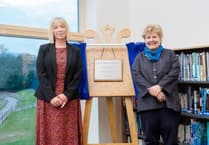Thousands of patients were waiting for routine treatment at Southern Health in March, new figures show.
It comes as a health and social care think tank warned efforts to reduce patients' waiting times are "stalling".
NHS England figures show 3,950 patients were waiting for non-urgent elective operations or treatment at Southern Health NHS Foundation Trust at the end of March – up from 3,505 in February.
Of those, one had been waiting for longer than a year.
The median waiting time from referral to treatment at Southern Health was five weeks at the end of March – the same as the month before.
Meanwhile, 6.25 million people in England were waiting to start treatment at the end of March – up slightly from 6.24 million in February.
It means the national waiting list for routine hospital treatment has risen for the first time in seven months.
The list hit a record high in September 2023, with 6.5 million patients waiting to start treatment.
Reacting to these figures, Sarah Scobie, deputy director of research at the Nuffield Trust, said: "The number of people facing extremely long waits for a hospital appointment has reduced, but progress in bringing down the overall waiting list is stalling.
"The Government is hoping that initiatives like expanding use of advice and guidance in general practice will help, so a big question as ministers prepare the 10 Year Health Plan is whether things will get back on track with driving down the backlog."
Separate figures show 1.7 million patients in England were waiting for a key diagnostic test in March – the same as in February.
At Southern Health, 3,165 patients were waiting for one of nine standard tests, such as an MRI scan, non-obstetric ultrasound or gastroscopy at this time.
Of them, 27 (1%) had been waiting for at least six weeks.
Other NHS England figures show cancer patients across England are not being treated quickly enough.
Nationally, 78.9% of patients urgently referred were diagnosed or had cancer ruled out within 28 days in March – down from 80.2% the previous month.
However, 71.4% began treatment within the recommended 62 days, up from 67% in February and the highest figure since this measure was first reported in spring 2022.
The Government and NHS England have set a target of March 2026 for this figure to reach 75%.
Dr Katharine Halliday, president of the Royal College of Radiologists, welcomed the "encouraging progress" on cancer diagnosis times, but warned the improvement pace remains "sluggish".
She added: "Once diagnosed, too many patients still face excessive waits to start cancer treatment.
"Demand for cancer diagnosis and treatment is rising, so we must take a long-term approach to tackle the backlog for good.
"We urge the Government to invest in the workforce by training up more radiologists and oncologists."
Health and Social Care Secretary Wes Streeting said: "Since day one, we have been clear it will take time to reverse the disastrous waiting list we inherited.
"But since July, real progress has been made – including over winter. We have overseen a massive increase in appointments available to meet rising demand, reduced long waits and helped people get diagnosed quicker.
"Our Plan for Change will continue to put patients first as we work to end the misery felt by millions up and down the country who have been denied the care they need for too long."



